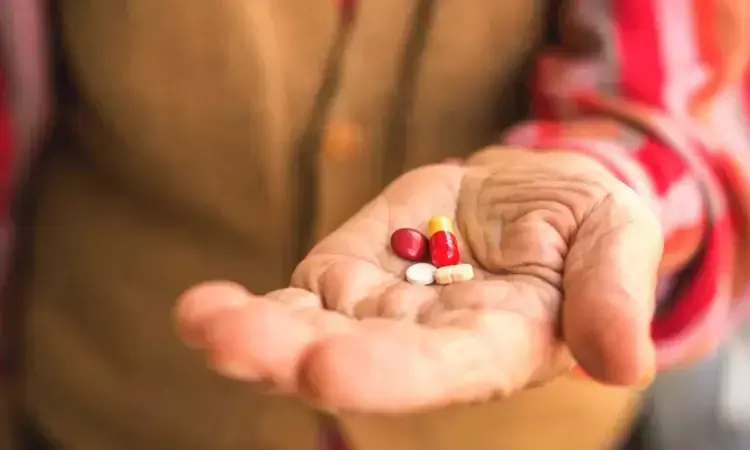- Home
- Medical news & Guidelines
- Anesthesiology
- Cardiology and CTVS
- Critical Care
- Dentistry
- Dermatology
- Diabetes and Endocrinology
- ENT
- Gastroenterology
- Medicine
- Nephrology
- Neurology
- Obstretics-Gynaecology
- Oncology
- Ophthalmology
- Orthopaedics
- Pediatrics-Neonatology
- Psychiatry
- Pulmonology
- Radiology
- Surgery
- Urology
- Laboratory Medicine
- Diet
- Nursing
- Paramedical
- Physiotherapy
- Health news
- Fact Check
- Bone Health Fact Check
- Brain Health Fact Check
- Cancer Related Fact Check
- Child Care Fact Check
- Dental and oral health fact check
- Diabetes and metabolic health fact check
- Diet and Nutrition Fact Check
- Eye and ENT Care Fact Check
- Fitness fact check
- Gut health fact check
- Heart health fact check
- Kidney health fact check
- Medical education fact check
- Men's health fact check
- Respiratory fact check
- Skin and hair care fact check
- Vaccine and Immunization fact check
- Women's health fact check
- AYUSH
- State News
- Andaman and Nicobar Islands
- Andhra Pradesh
- Arunachal Pradesh
- Assam
- Bihar
- Chandigarh
- Chattisgarh
- Dadra and Nagar Haveli
- Daman and Diu
- Delhi
- Goa
- Gujarat
- Haryana
- Himachal Pradesh
- Jammu & Kashmir
- Jharkhand
- Karnataka
- Kerala
- Ladakh
- Lakshadweep
- Madhya Pradesh
- Maharashtra
- Manipur
- Meghalaya
- Mizoram
- Nagaland
- Odisha
- Puducherry
- Punjab
- Rajasthan
- Sikkim
- Tamil Nadu
- Telangana
- Tripura
- Uttar Pradesh
- Uttrakhand
- West Bengal
- Medical Education
- Industry
Vitamin B1 Shows Promise in Preventing Alcohol-Related Headaches: Study

A recent study published in the journal of Nutritional Neuroscience offers new understanding of how alcohol-induced headaches develop and suggest that vitamin B1 could serve as an effective preventive treatment.
A multidisciplinary neuroscience team investigate the impact of alcohol on the brain’s neurovascular unit, focusing on key cellular players (endothelial cells, astrocytes, and neurons) to analyze how alcohol causes headaches and how vitamin B1 might help.
Using cultured cells, the study exposed these brain components to ethanol and discovered that hippocampal neurons were particularly vulnerable. Unlike endothelial cells and astrocytes, which showed relative resistance, neurons experienced high rates of cytotoxicity which was consistent across both cell-based experiments and animal models.
Alcohol was found to disrupt cerebral blood flow (CBF), causing transient but significant reductions in oxygen delivery to neurons. This hypoxic stress, captured through two-photon microscopy in live mice, resulted in selective neuronal death, particularly in the hippocampus which is linked to pain processing and memory.
Vitamin B1 emerged as a neuroprotective agent in this scenario. Pre-treatment with thiamine restored CBF homeostasis, reduced oxidative stress markers like reactive oxygen species (ROS), and significantly limited neuronal damage. Behavioral tests in mice, including open field and pain sensitivity assays, revealed reduced signs of headache-like discomfort in vitamin B1-treated groups compared to controls.
While the study did not include a formal table in this format, this research found neurons exposed to alcohol to show a marked increase in cell death (over 60%) when compared to endothelial cells (10%) and astrocytes (15%). Vitamin B1 reduced neuron death to under 25%.
Alcohol caused a 40% reduction in regional blood flow in the hippocampus. Vitamin B1 reduced this decline, preserving over 80% of normal blood flow. Also, alcohol elevated ROS in neurons by nearly 300%, while vitamin B1 brought ROS levels back down to near baseline. The mice given alcohol expressed increased pain behaviors, while the mice pre-treated with vitamin B1 showed a 50% reduction in these symptoms.
This study emphasized the potential of vitamin B1 as a preventive supplement for individuals prone to alcohol-induced headaches. Overall, vitamin B1 not only reduces the neurovascular consequences of alcohol consumption but also offers a promising strategy to reduce hangover-related suffering, which could reshape headache prevention in social and clinical settings.
Source:
Cao, Q., Gao, Y., Li, Z., Xiao, Y., Shen, C., Xiong, Y., Xu, S., Chua, Y., Li, Y., Yang, J., Cao, X., & Meng, L. (2025). The protective role of vitamin B1 in alcohol related headaches induced by disturbance of blood flow and direct cytotoxicity to hippocampal neuron. Nutritional Neuroscience, 1–18. https://doi.org/10.1080/1028415X.2025.2536655
Neuroscience Masters graduate
Jacinthlyn Sylvia, a Neuroscience Master's graduate from Chennai has worked extensively in deciphering the neurobiology of cognition and motor control in aging. She also has spread-out exposure to Neurosurgery from her Bachelor’s. She is currently involved in active Neuro-Oncology research. She is an upcoming neuroscientist with a fiery passion for writing. Her news cover at Medical Dialogues feature recent discoveries and updates from the healthcare and biomedical research fields. She can be reached at editorial@medicaldialogues.in
Dr Kamal Kant Kohli-MBBS, DTCD- a chest specialist with more than 30 years of practice and a flair for writing clinical articles, Dr Kamal Kant Kohli joined Medical Dialogues as a Chief Editor of Medical News. Besides writing articles, as an editor, he proofreads and verifies all the medical content published on Medical Dialogues including those coming from journals, studies,medical conferences,guidelines etc. Email: drkohli@medicaldialogues.in. Contact no. 011-43720751


